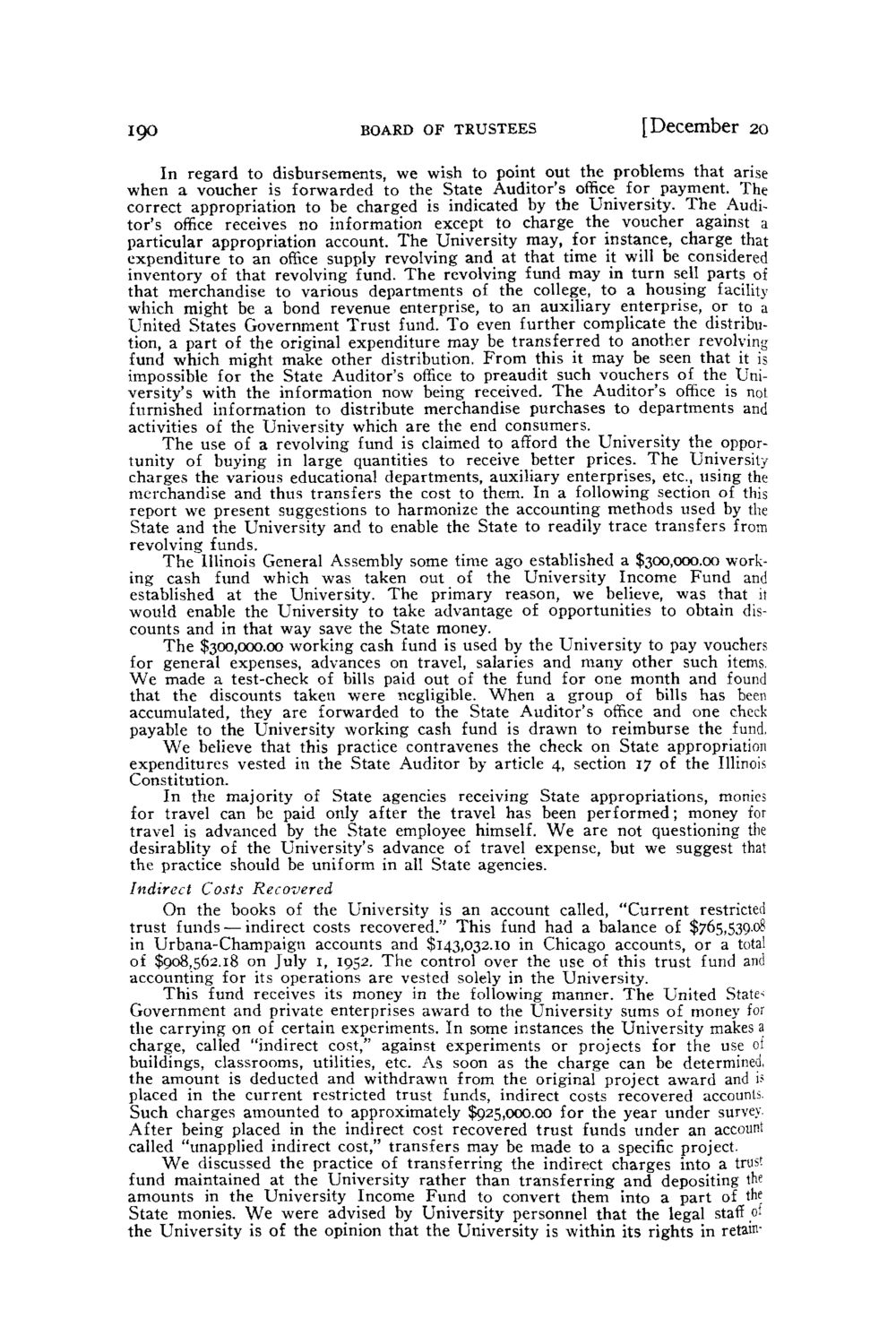| |
| |
Caption: Board of Trustees Minutes - 1956
This is a reduced-resolution page image for fast online browsing.

EXTRACTED TEXT FROM PAGE:
190 BOARD OF TRUSTEES [December 20 In regard to disbursements, we wish to point out the problems that arise when a voucher is forwarded to the State Auditor's office for payment. The correct appropriation to be charged is indicated by the University. The Auditor's office receives no information except to charge the voucher against a particular appropriation account. The University may, for instance, charge that expenditure to an office supply revolving and at that time it will be considered inventory of that revolving fund. T h e revolving fund may in turn sell parts of that merchandise to various departments of the college, to a housing facility which might be a bond revenue enterprise, to an auxiliary enterprise, or to a United States Government Trust fund. T o even further complicate the distribution, a part of the original expenditure may be transferred to another revolving fund which might make other distribution. F r o m this it may be seen that it is impossible for the State Auditor's office to preaudit such vouchers of the University's with the information now being received. T h e Auditor's office is not furnished information to distribute merchandise purchases to departments and activities of the University which are the end consumers. T h e use of a revolving fund is claimed to afford the University the opportunity of buying in large quantities to receive better prices. T h e University charges the various educational departments, auxiliary enterprises, etc., using the merchandise and thus transfers the cost to them. In a following section of this report we present suggestions to harmonize the accounting methods used by the State and the University and to enable the State to readily trace transfers from revolving funds. T h e Illinois General Assembly some time ago established a $300,000.00 working cash fund which was taken out of the University Income Fund and established at the University. The primary reason, we believe, was that it would enable the University to take advantage of opportunities to obtain discounts and in that way save the State money. T h e $300,000.00 working cash fund is used by the University to pay vouchers for general expenses, advances on travel, salaries and many other such items. W e made a test-check of bills paid out of the fund for one month and found that the discounts taken were negligible. When a group of bills has been accumulated, they are forwarded to the State Auditor's office and one check payable to the University working cash fund is drawn to reimburse the fund, W e believe that this practice contravenes the check on State appropriation expenditures vested in the State Auditor by article 4, section 17 of the Illinois Constitution. In the majority of State agencies receiving State appropriations, monies for travel can be paid only after the travel has been performed; money for travel is advanced by the State employee himself. W e are not questioning the desirablity of the University's advance of travel expense, but we suggest that the practice should be uniform in all State agencies. Indirect Costs Recovered On the books of the University is an account called, "Current restricted trust funds — indirect costs recovered." This fund had a balance of $765,539.08 in Urbana-Champaign accounts and $143,032.10 in Chicago accounts, or a total of $908,562.18 on July 1, 1952. The control over the use of this trust fund and accounting for its operations are vested solely in the University. This fund receives its money in the following manner. T h e United States Government and private enterprises award to the University sums of money for the carrying on of certain experiments. In some instances the University makes a charge, called "indirect cost," against experiments or projects for the use of buildings, classrooms, utilities, etc. As soon as the charge can be determined, the amount is deducted and withdrawn from the original project award and is placed in the current restricted trust funds, indirect costs recovered accounts. Such charges amounted to approximately $925,000.00 for the year under survey. After being placed in the indirect cost recovered trust funds under an account called "unapplied indirect cost," transfers may be made to a specific project. W e discussed the practice of transferring the indirect charges into a trust fund maintained at the University rather than transferring and depositing the amounts in the University Income Fund to convert them into a part of the State monies. W e were advised by University personnel that the legal staff oi the University is of the opinion that the University is within its rights in retain-
| |